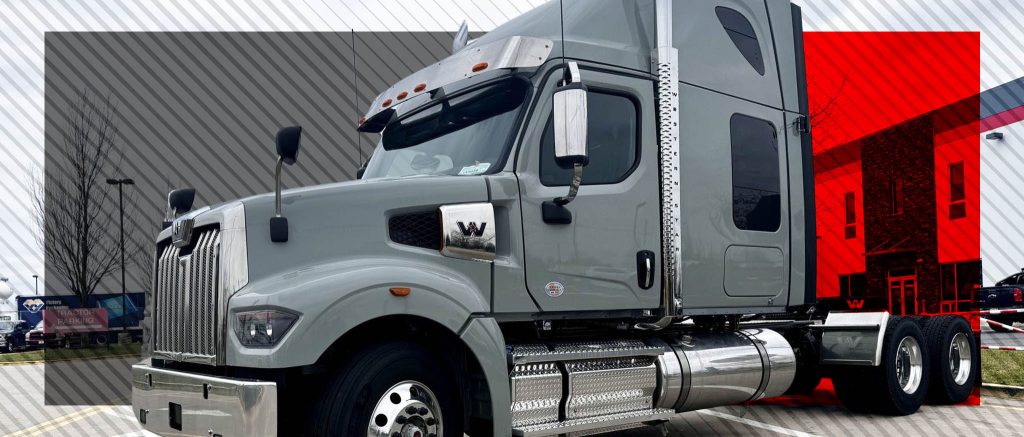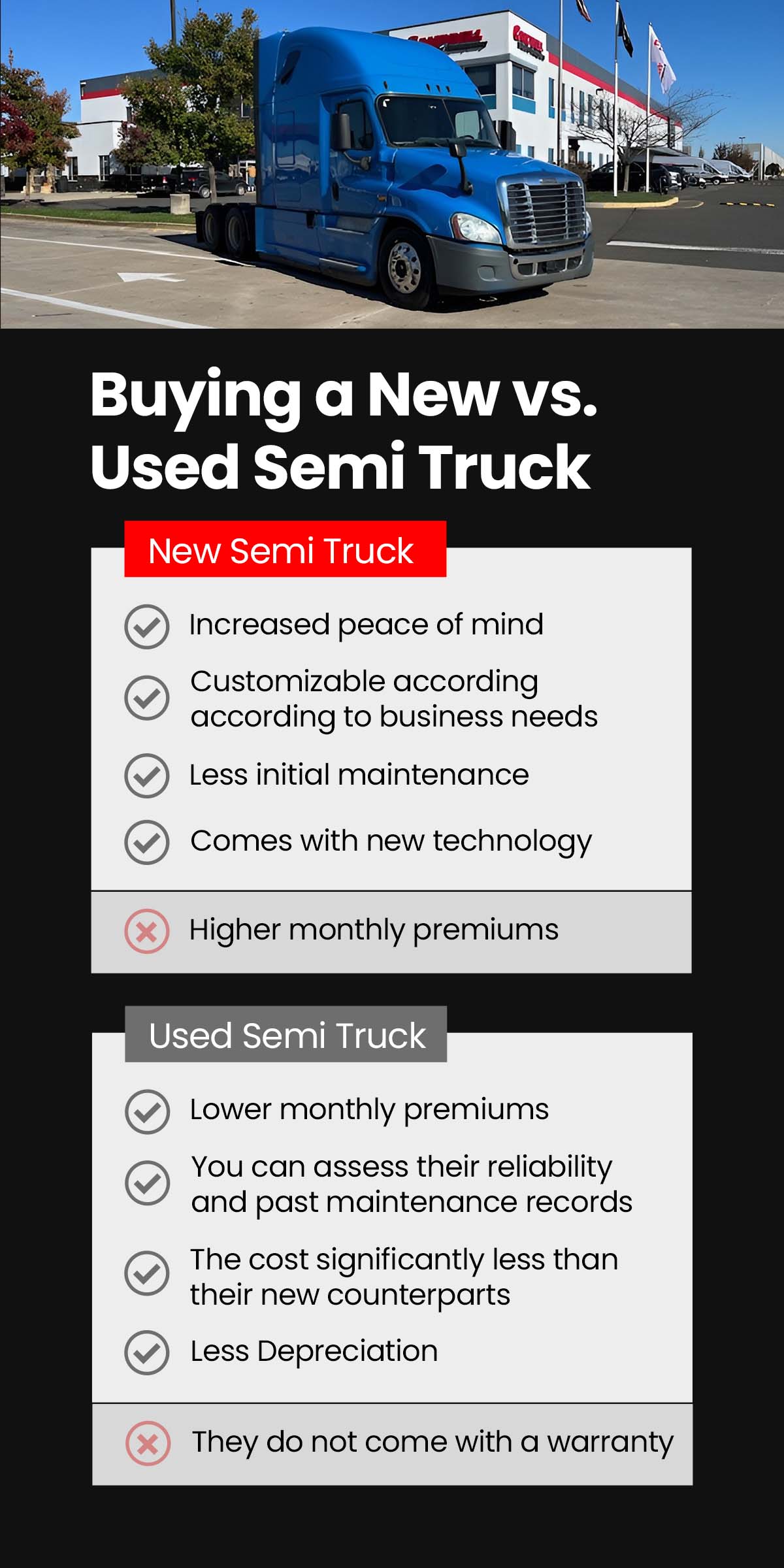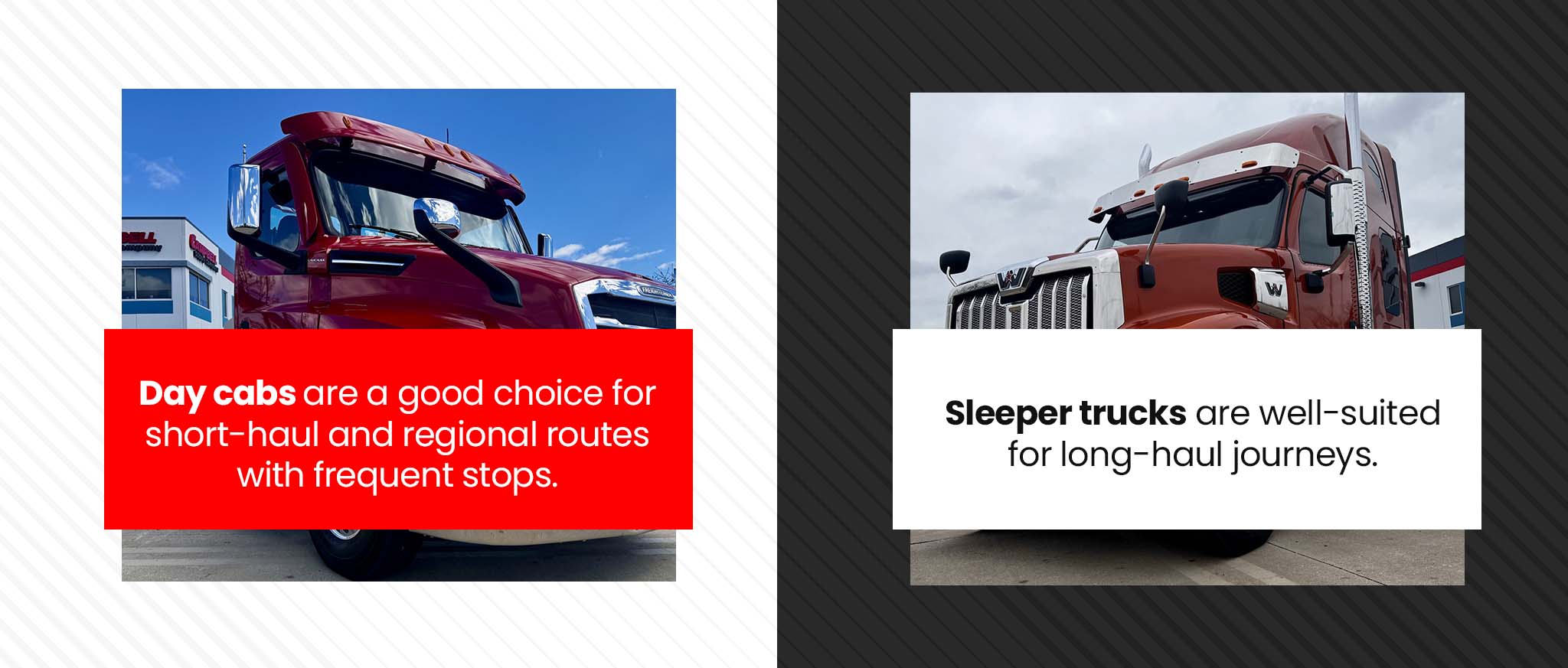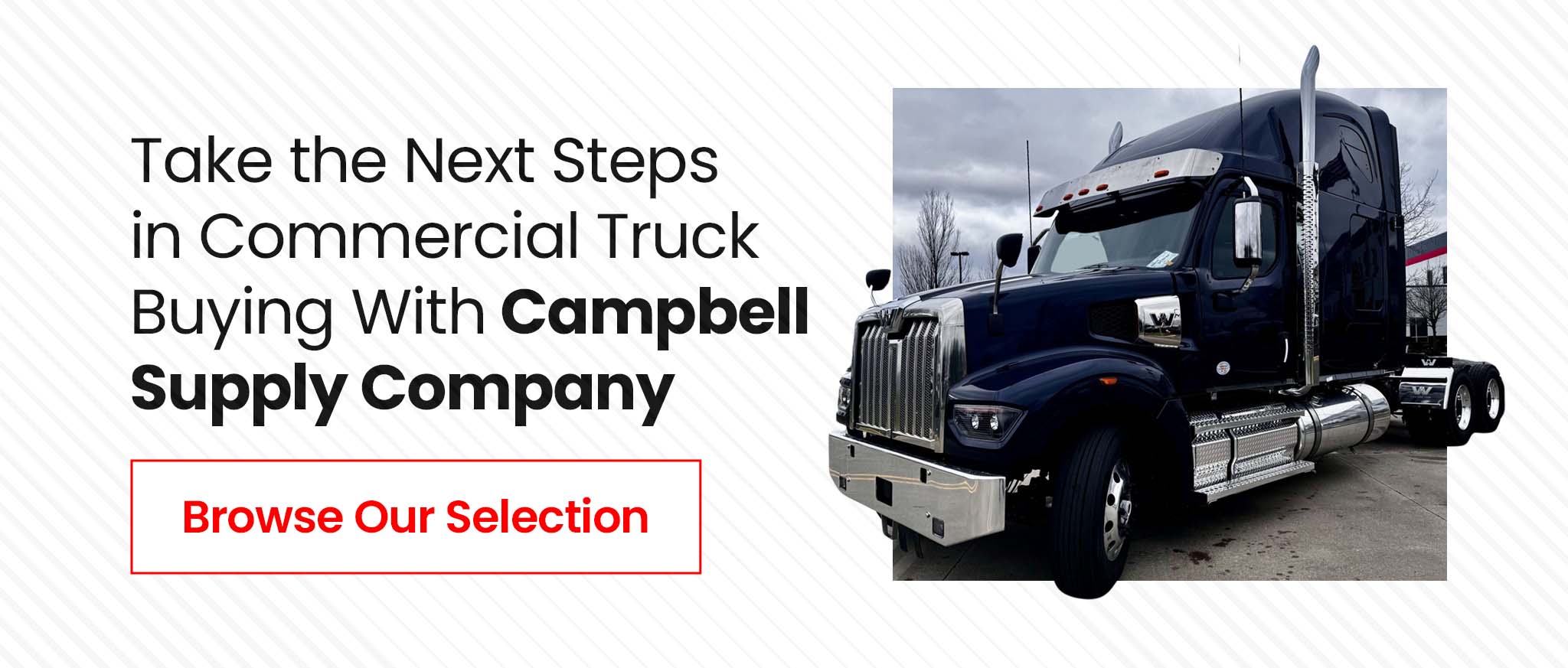Commercial trucks allow drivers to haul various kinds of cargo on long routes. Buying a new truck to support your endeavors is an investment in your business’s growth and can help lower operational costs — as long as you determine you are taking on a viable investment.
Understanding the types of commercial trucks available and which key factors impact performance and reliability will empower you to make the right decision. Follow our commercial truck buying tips and ensure you choose the right semi truck for your operations.
How to Choose a Commercial Truck
Whether you are starting a business or have ample experience as an owner-operator of a trucking business, each vehicle purchase requires careful planning and analysis. Start by determining what you need from a new truck and whether a new or used vehicle will best support your business needs.
Determining Your Requirements
There are several factors to consider when buying a commercial truck. This analysis will help guide your purchasing decision, ensuring you find a vehicle that meets your business and industry needs.
Start by defining your business needs. Consider the types of materials you frequently transport, the terrain and distance of your regular routes, and any special requirements for loading or unloading cargo. Additional requirements you may have include:
- Capacity and payload: Determine the truck’s cargo capacity and payload, considering cargo volume and weight. Also, consider potential business growth and how this may affect your truck’s longevity.
- Chassis and body configuration: Consider the truck bed or body you need for effective transportation, along with any specialized equipment or accessories you must add to the truck.
- Technology and connectivity: Technological features like GPS, telematics systems for tracking or monitoring, and connectivity for electronic logging devices (ELDs) can streamline your operations while adding more transparency.
- Total cost of ownership: Factors like purchase price, fuel costs, maintenance, repairs, financing and insurance contribute to the vehicle’s total cost of ownership. Use this information to find opportunities where you can maximize the truck’s value and performance while lowering costs.
- Environmental impact: If your business prioritizes sustainability, consider the truck’s environmental impact. You can look for a more fuel-efficient engine, a sustainable electric vehicle or emission control systems that align with your organization’s environmental goals.
- Service and support: You should opt for a truck with reliable service and support options. These include parts availability, warranty coverage, maintenance facilities, and the dealership or manufacturer’s customer support.
Exploring Optional Features
Optional features can add to a semi truck’s comfort and operational efficiency. If you want to customize your semi truck to suit your needs better, consider adding these features:
- Low rolling resistance: Adding tires with low roll resistance reduces fuel consumption, as these tires use less energy during a turn.
- Fairings: These metal or plastic fixtures can increase the truck’s operational efficiency by reducing drag.
- Aluminum wheels: Take the strain off your axles when transporting heavy loads by opting for lightweight aluminum wheels.
- Side skirts: Side skirts are protective side coverings that minimize wind resistance under the trailer, which can help increase driving speed.
- Mud flaps: You can increase the truck’s fuel efficiency by lowering wind resistance with mud flaps.
- Computer-controlled transmissions: Digital sensors on newer semi trucks can control transmission during driving, which increases fuel efficiency.
- Wide tires: Wider tires can increase driver safety since they improve the truck’s road handling.
Buying a New vs. Used Semi Truck
Whether you are buying a new or used semi truck, each has its own set of advantages and disadvantages. New vehicles come with higher monthly premiums, but they have several benefits:
- Warranty: New trucks come with increased peace of mind. You get a warranty to protect you against potential mechanical issues.
- Customization: You can often customize new vehicles according to specs that suit your business needs.
- Lower maintenance costs: New vehicles typically need less initial maintenance because they are not subject to wear and tear.
- New technology: The latest vehicles come with new technology, including better safety features, fuel-efficient engines and better driver comfort.
Used trucks cost significantly less than their new counterparts. While they do not typically come with a warranty, you can expect a few other benefits:
- Monthly payments: Used trucks have lower monthly premiums and often require a lower down payment to purchase. Financing these vehicles may also have a reduced credit score requirement.
- Proven reliability: Used trucks from a reputable dealer will come with a track record of performance, so you can assess their reliability and past maintenance records.
- Less depreciation: Buying a vehicle that has already moved through the bulk of its depreciation means it will steadily maintain its value over time.
- Lower insurance costs: The insurance premiums on a used truck will be lower than on a new truck, which reduces your operating expenses.
Exploring Truck Components and Their Functions
Ensuring that the critical functions of the truck you want to buy will serve your business needs is essential. Some of the primary considerations are:
- Horsepower: Most semi trucks have engines that produce more than 400 horsepower, so opting for a bigger engine is a good idea if you want your engine to have better longevity.
- Tires: Select tires that can handle the terrain your truck will frequent. Ensure they have adequate grip and the right tread and that they are from a reputable brand.
- Axles: Axles and their placement determine the amount of cargo the semi truck can effectively transport. More axles mean better weight capacity, which may impact the truck’s price and affect the roads they travel on, making it important to stay within the limits of the Generalized Fourth Power Law.
- Freight: The truck you select must be able to support the cargo. This information will determine the size of the truck you will buy.
- Weather: Driving in extreme climates will require additional features, such as weatherstripping.
- Terrain: If the truck navigates flat areas more, you can bypass any additional braking gears made for driving down mountainous inclines.
- Fuel efficiency: Find a balance between the trucks’ storage capacity and highway mileage. Ideally, you want a semi truck that can transport cargo in the shortest time possible.
- Resale value: As it is unlikely that you will keep the truck until the end of its life span, consider a truck that will easily adapt to carrying freight for various industries.
Here are three commercial truck components:
Semi Trucks
Semi trucks consist of a powerful tractor unit that, when connected to a trailer, can haul freight over long distances. Their distinctive design features a coupling device that connects the tractor to the trailer. Their impressive hauling capacity and versatility play a crucial role in global supply chains.
Semi Trailers
These large trailers store the cargo and get attached to the semi truck. They typically feature axles and a hitch mechanism connecting to the tractor unit. They come in various shapes and configurations, depending on the cargo. For example, a flatbed trailer is flat and open, ideal for hauling raw materials like lumber.
18-Wheelers
An 18-wheeler is what you get when you fit the semi truck and the semi trailer together. The new vehicle has 18 wheels, resulting in an 18-wheeler. These trucks are sometimes called tractor-trailers.
Used Semi Truck Buying Tips
If you decide to buy a used semi truck, there are a few additional points to check before you commit to your purchase. This is why it is vital to partner with a reputable dealer who will share all of the following information with you, ensuring that you buy a good quality vehicle:
- Rust: If the semi truck has rust, your cargo will not be secure during transport. Pay attention to bubbles under the truck’s surface, as these are rust indicators. You should also check that the breaks have no signs of corrosion, which can affect their responsiveness.
- Logs: Inspect the maintenance logs and hours the truck logged to understand better how well the vehicle was maintained. Look to ensure that all the tires were changed at the same time, so they have the same mileage and offer the same support.
- Tires: Check for bent hubcaps and cracks, which can be indicators of past overloading, lowering the truck’s life span.
- Windows and doors: Ensure that windows and doors seal properly, as loose seals lower air resistance on the road.
- Lights: Increase driver safety and ensure compliance by checking that the lights work efficiently.
- Engine: Ensure that there is no smoke, dirt, rust, odd noises, leaks or bad cables that can damage the engine and lead to costly repairs.
- Oil: The truck’s oil should be clean, as contaminated oil leads to engine and parts damage.
Prioritizing Safety and Comfort in Commercial Trucks
It is essential to ensure that your truck meets safety and compliance standards like the Occupational Safety and Health Administration’s (OSHA) Section 4(b)1, which enforces the regulation of work conditions. Consider how features like advanced braking systems, visibility enhancements and stability control can improve drivers’ safety and comfort. You can also prevent driver fatigue by installing a comfortable, ergonomic seat.
Day Cab vs. Sleeper Trucks
The choice between day cabs and sleeper trucks depends on the routes your fleet frequents. Day cabs are a good choice for short-haul and regional routes with frequent stops. Sleeper trucks feature a compartment behind the truck’s cabin with overnight accommodation for the driver, which makes this option well-suited for long-haul journeys.
Automated vs. Manual
Another comfort consideration is whether to choose automatic or manual transmission. Automatic trucks are easier to operate, with shorter training periods for drivers, less driving fatigue and more consistent shifting, which leads to better fuel efficiency. Manual transmission trucks offer drivers better control over gear selection to navigate varying loads and road conditions. A manual truck will also contribute to better fuel efficiency in these situations. These trucks also come with lower upfront costs but require more driver skills.
Maintenance and Repairs
Consider the truck’s maintenance requirements and whether the dealer you are buying from offers preventive maintenance. Additionally, you must confirm that replacement parts are readily available and that the dealer offers service support for the make and model of the truck you want to buy. This confirmation will simplify processes when you need to schedule services. Finally, determine the extent of the warranty coverage the dealer or manufacturer provides and how much of this extends to the drive terrain, engine and other components.
Environmental Considerations
Prioritizing environmental considerations when buying a commercial truck helps lower your organization’s ecological footprint and operating costs. Key factors you can consider as you peruse potential vehicles include:
- Emissions standards: Look for vehicles that meet the current emissions standards set by the Environmental Protection Agency (EPA). Trucks with cleaner-brining engines reduce air pollution and greenhouse gas emissions.
- Idle reduction technology: Trucks that feature idle reduction technology like auxiliary power units (APUs) or automatic engine shutdown systems lower unnecessary idling during rest periods. This conserves fuel, complies with anti-idling regulations and reduces emissions.
- Lifecycle analysis: Choose a vehicle that uses eco-friendly materials, efficient production processes and recyclable components for a lower environmental footprint. You can also opt for these materials during any routine maintenance or repairs.
- Regulatory compliance: Keep up to date with commercial trucks’ environmental regulations and requirements in your area. Aim to have a vehicle that adheres to emission standards and noise regulations, among other environmental mandates.
Financing Your Commercial Truck Purchase
It is essential to finance your new vehicle with a reputable company. Campbell Supply Company offers financing solutions in and around the South Brunswick area. We have professional staff who are ready to guide you through financing and offer:
- Expert truck financing: You can look forward to specialized financing solutions for pre-owned and new semi trucks.
- Competitive quotes: Our expert team quickly sends you a competitive quote. You can also use our finance calculator to test payment scenarios as you browse vehicles. Additionally, our streamlined application process ensures that you get prompt responses.
- Local focus: We understand the local area and offer you tailored financing plans to match.
Take the Next Steps in Commercial Truck Buying With Campbell Supply Company
Selecting the right commercial truck is a vital decision that can impact the success of your business. It is essential to consider the type of truck and how its functions align with your operational requirements. Prioritizing reliability, efficiency and cost-effectiveness ensures regulatory compliance and an investment that yields long-term dividends. Following our semi truck buying tips, you might be ready for the next steps.
At Campbell Supply Company, we prioritize your needs. With an extensive inventory of parts and a team of factory-trained and certified technicians, we’re ready to offer you efficient and reliable service. Our commercial truck showrooms are ready to offer you a selection of new and used commercial trucks to buy, including reliable brands like Isuzu, Western Star and Freightliner. Partner with us for your emergency and commercial vehicle needs. Contact us today to find out how we can maximize your fleet performance and reliability.










